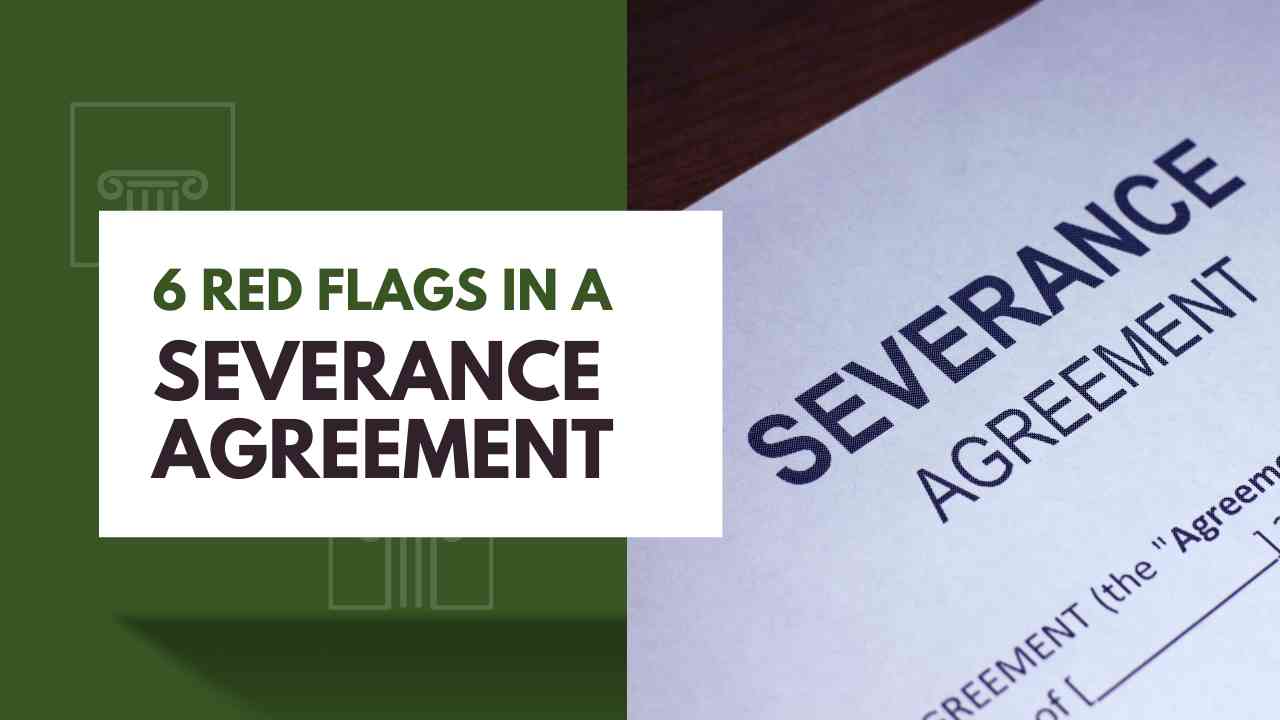
Hi! beautiful people. I`m an authtor of this blog. Read our post – stay with us

Unfairly treated or fired at work?

A severance agreement is a contract given to employees—usually at the end of employment—that sets out what you’ll receive in exchange for waiving certain rights. Common elements include severance pay, continuation of benefits, confidentiality clauses, and sometimes non-compete or non-disparagement terms.
Severance agreements are most often offered to employees who are let go without cause, but can also appear in restructuring or mutual separation scenarios. Because these documents are packed with legal language, it’s easy to overlook red flags that could have a lasting impact on your career and rights.
Most employees sign severance agreements without reading the fine print—often eager to move on, or pressured to accept what’s offered. But what exactly is a severance agreement, and why does it matter? A severance agreement is a legal contract between you and your employer that outlines the terms of your departure, including compensation, benefits, and any conditions you must follow after leaving.
Understanding the red flags in severance agreements is crucial: one overlooked clause could cost you your rights, future job opportunities, or even your ability to speak about your experience. In this article, you’ll uncover six critical red flags in severance agreements and learn how to protect yourself before you sign
Understanding the red flags in severance agreements is crucial: one overlooked clause could cost you your rights, future job opportunities, or even your ability to speak about your experience. In this article, you’ll uncover six critical red flags in severance agreements and learn how to protect yourself before you sign
Identifying red flags in severance agreements can protect your rights. Employers may use complex legal wording to limit your ability to sue, restrict your future employment, or silence you about workplace issues.
Once you sign, the agreement is legally binding—and you might be giving up more than you realize. We’ve seen clients lose out on substantial entitlements simply because they didn’t spot a hidden clause or felt rushed to sign.
Many severance agreements require you to waive your right to sue for things like discrimination, harassment, or wrongful dismissal.
While some release of claims is standard, overly broad clauses can strip you of essential protections—even those you may not know you have. We’ve helped clients who nearly signed away their ability to pursue valid legal claims because of this very issue.
Some agreements forbid you from ever speaking negatively about your former employer, even if your comments are truthful. These clauses can prevent you from sharing your experience with future employers or regulatory bodies, and may even carry financial penalties for violations.
Be wary of language that restricts what you can say about your time at the company, or that limits your ability to discuss your severance terms. In some cases, confidentiality clauses are so sweeping they could even impact your ability to work elsewhere or participate in investigations.
Non-compete clauses in severance agreements can bar you from working in your field for months or years, or within a large geographic area.
We’ve seen clients nearly accept terms that would have forced them out of their chosen profession entirely. Always review these carefully and negotiate if they seem unreasonable.
If the agreement doesn’t clearly spell out how much you’ll receive, when you’ll get it, and how benefits will continue, you could be left with less than you expect. Vague language around “standard benefits” or unclear payment schedules are major red flags in severance agreements and can lead to disputes down the road.
Employers sometimes rush employees to sign, giving you only days—or even hours—to decide. High pressure tactics are a classic red flag, designed to prevent you from seeking legal advice or fully understanding your options.
If you see any of these red flags in your severance agreement, pause before signing.
Don’t sign immediately. Ask your employer for clarification or request changes in writing. Take the time to review every clause—especially those that seem broad, vague, or restrictive. Most importantly, consult with an employment lawyer who can identify hidden pitfalls and negotiate better terms on your behalf.
If you see any of these red flags in your severance agreement, getting legal advice can make the difference between a fair deal and a costly mistake.
If your severance agreement contains any of these red flags, or if you’re unsure about the terms, it’s essential to get legal advice before signing. A lawyer can help you understand what you’re giving up, negotiate for better terms, and ensure you don’t have regrets down the line.
We regularly help clients secure more equitable severance packages and avoid long-term consequences from rushed or unfair agreements.
Reviewing your severance agreement carefully is one of the most important steps you can take to protect your future. Don’t let pressure or confusing language force you into a bad deal.
Know your rights, watch for red flags in severance agreements, and reach out to a legal professional if you need help. Your career and peace of mind are worth it.

I’m Saad Mirza, the founder of Thrive Law, a employment law firm dedicated to helping employees across Ontario navigate challenging job terminations and workplace issues.
Copyright © 2025 All Rights Reserved By Thrive Law